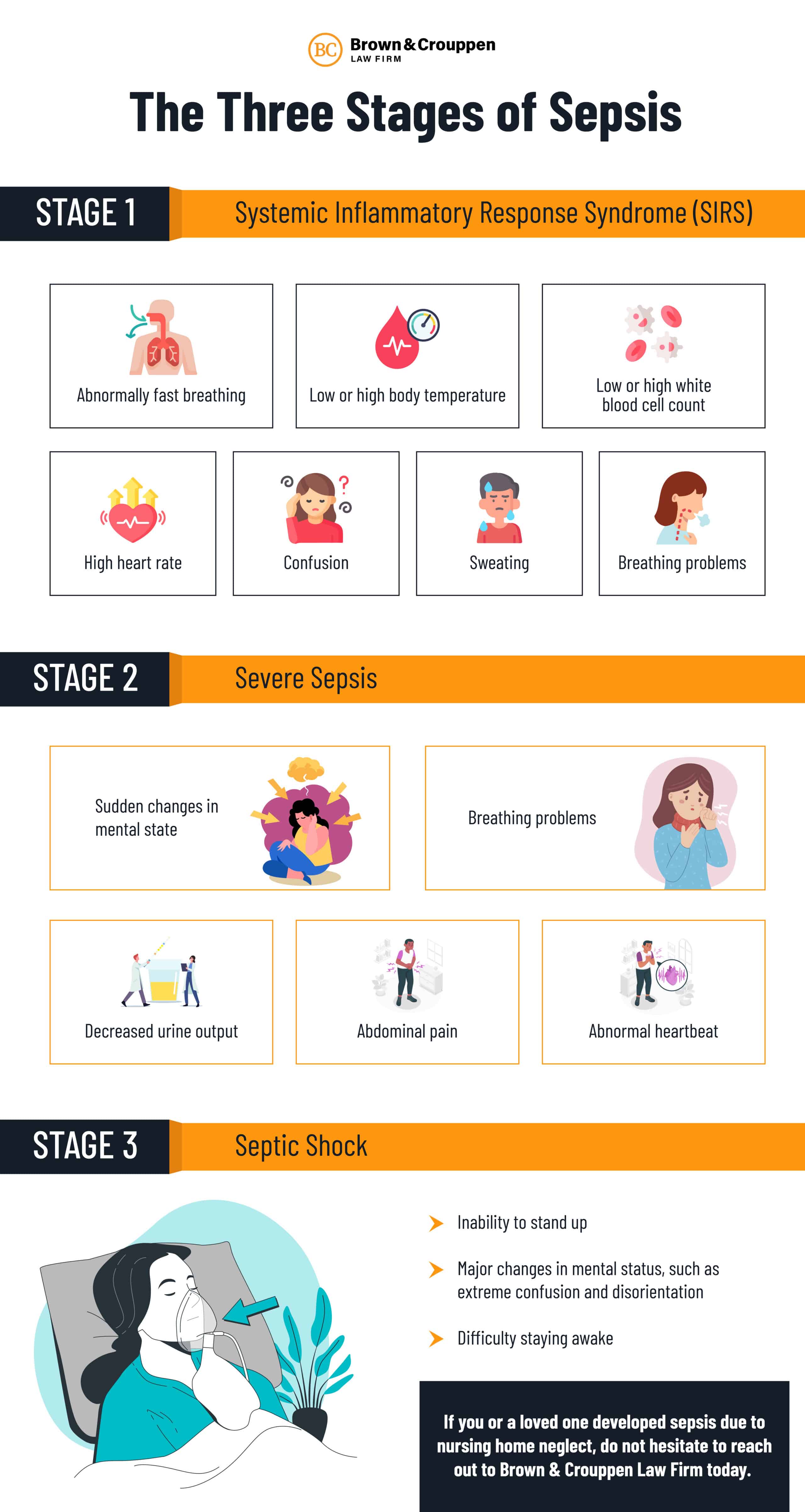Sepsis is a life-threatening condition that occurs when the body’s response to an infection causes organs to function poorly. There are three stages of sepsis: systemic inflammatory response syndrome (SIRS), severe sepsis, and septic shock. As the condition worsens, the organs may start to malfunction. Sepsis is a serious condition that must be treated swiftly to avoid fatal consequences.
If your loved one developed sepsis while staying at a care facility, our Missouri nursing home abuse lawyers can help you pursue legal compensation. When you work with our leading personal injury law firm, you can rest assured that your case is in good hands. Call (800) 536-4357 or contact us online to schedule a free consultation with our skilled legal team.
Stage 1: Systemic Inflammatory Response Syndrome (SIRS)
The first stage of sepsis is SIRS, which stands for systemic inflammatory response syndrome. Typical signs and symptoms of SIRS include:
- Abnormally fast breathing
- Low or high body temperature
- Low or high white blood cell count
- High heart rate
- Confusion
- Sweating
- Breathing problems
Stage 2: Severe Sepsis
The second stage—severe sepsis—is diagnosable when hypoperfusion (decreased blood flow through an organ) or hypotension (low blood pressure) are present. Other signs and symptoms of severe sepsis include:
- Sudden changes in mental state
- Breathing problems
- Decreased urine output
- Abdominal pain
- Abnormal heartbeat
Stage 3: Septic Shock
The third and final stage of sepsis is known as septic shock. This condition is characterized by persistent hypotension despite attempts to restore blood pressure. Other signs include elevated lactate levels, indicating problems with perfusion (blood delivery to tissues).
Septic shock requires immediate medical intervention, which may involve antibiotics and intravenous (IV) fluids, to stabilize the patient’s circulatory system and prevent organ failure. Septic shock symptoms include:
- Inability to stand up
- Major changes in mental status, such as extreme confusion and disorientation
- Difficulty staying awake
People with septic shock have a much higher risk of death. End-of-life sepsis symptoms include excessive bleeding, increased lactate levels in your blood, kidney damage, and metabolic failure.
Treatment
Sepsis progresses quickly and can cause irreversible harm if it is not identified and treated early. In many cases, it is fatal. If you suspect you have sepsis, it is crucial to get diagnosed and treated as soon as possible.
If you receive a sepsis diagnosis, doctors will usually place you in an intensive care unit (ICU). Sepsis treatment may include:
- Vasopressor medications to help your blood pressure reach a safe level.
- Surgery to remove damaged tissue.
- Antibiotics for bacterial infection.
- IV fluids to maintain blood flow to organs and prevent blood pressure from dropping.
- Supportive treatments, such as mechanical ventilation for breathing difficulties or dialysis for kidney failure.
What Causes Sepsis and Sepsis Shock?
Common causes of sepsis and septic shock include bacterial, viral, parasitic, or fungal infections. If an infection sets off a chain reaction in your body and is not treated in time, it can cause organ dysfunction. Though infections can start anywhere, they typically start in the:
- Respiratory system, especially in the lungs.
- Urinary tract system, especially if you use a catheter.
- Gastrointestinal system, including the appendix, liver, gallbladder, and bowels.
- Central nervous system, especially in the spinal cord and brain.
- Skin via openings, such as IV and catheter insertion sites, lacerations, and open sores.
Nursing Home Neglect and Sepsis
In some cases, sepsis may be a warning sign of nursing home neglect or abuse. For example, overworked and under-trained staff may fail to regularly turn bed-bound residents, causing severe bed sores that can lead to sepsis.
Nursing homes have a legal duty to ensure elderly residents are well-cared for, clean, and given medical treatment when needed. You may be eligible to sue a nursing home for sepsis if it was caused by neglect on the part of staff and administrators. Examples of nursing home neglect include:
- Failure to change dirty bed linens.
- Poor sanitation in kitchens, bathrooms, and common areas.
- Failure to regularly bathe residents.
- Understaffing or overworking employees, impairing their ability to provide an appropriate level of care to residents.
- Downplaying medical complaints when specialized or emergency care is required.
Nursing Home Residents at Risk
Seniors in nursing homes often face a higher risk of sepsis due to weakened immune systems, which makes it harder to combat infections. Nursing home residents with the following conditions have a higher risk of septic shock:
- Heart valve problems
- Artificial joints
- Immune system disorders
- Diabetes
- Kidney disease
- AIDS
- Cancer, such as lymphoma or leukemia
Our Nursing Home Abuse Lawyer Can Help Sepsis Victims
If you or a loved one developed sepsis due to nursing home neglect, do not hesitate to reach out to our award-winning personal injury law firm. Founded by Ron Brown and Terry Crouppen, our firm is dedicated to securing justice for people harmed by the carelessness of others.
With decades of combined experience, our skilled legal team has what it takes to handle your case. We take cases on a contingency fee basis, which means there are no upfront legal fees, and we only get paid if you win.
Serving clients in St. Louis, Kansas City, and throughout Missouri, our knowledgeable and compassionate nursing home abuse attorneys are standing by to listen to your story and determine your eligibility to file a sepsis lawsuit. Call (800) 536-4357 or fill out our online contact form to schedule a free consultation.







